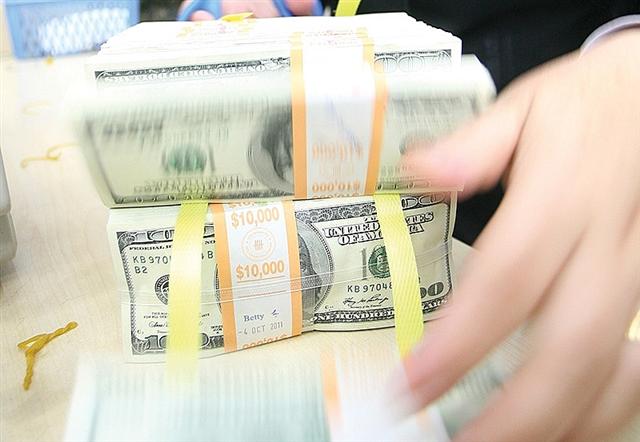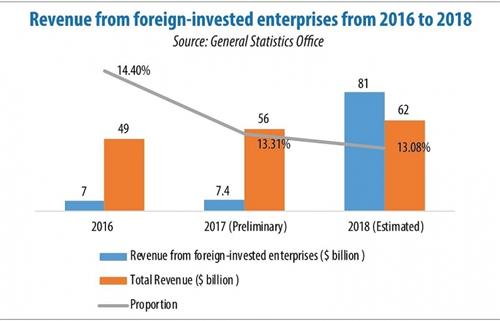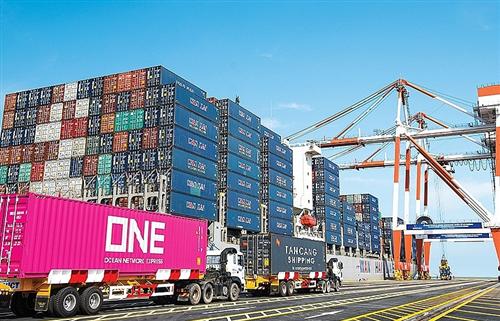Modest deficit in future for account
Modest deficit in future for account
An expected decline caused by the global health crisis in exports and inflows of foreign investment and remittances is likely to weaken Vietnam’s external position this year.

About 70 per cent of Vietnam’s export revenues comes from foreign-invested enterprises. Photo: Le Toan
|
According to a fresh forecast from the Asian Development Bank (ADB), Vietnam’s current account balance is expected to fall into a deficit equal to 0.2 per cent of GDP this year, recovering to a 1 per cent surplus in 2021.
Previously the ADB predicted that the rate would be 2 per cent of GDP in 2020 thanks to a high trade surplus, foreign direct investment (FDI), and big remittances. However, the grave impacts of COVID-19 have prompted the bank to revise its forecast.
Vietnam’s GDP last year hit $255 billion – thus if GDP grows by 5 per cent this year, it will be $267.8 billion, and the current account deficit will be about $535.6 million, or 0.2 per cent of GDP.
Vietnam has continuously earned a current account surplus since 2011. It reached 2.9 per cent in 2017, 3 per cent in 2018, and 3 per cent last year.
Meanwhile, the World Bank also stated that Vietnam’s external position is projected to deteriorate in 2021, mainly as the result of the fall in exports of tourism services and lower FDI inflows, both results of the current pandemic.
Fitch Ratings also expected the economy’s current account to shift to a modest deficit in 2020, from a surplus of around 3 per cent in 2019, as exports, tourism, and remittances decline. However, it should return to a surplus next year as the global economy recovers.
FDI inflow and disbursement have already slowed. In the first quarter of this year newly-registered, newly-added, and stake acquisition-based capital hit $8.55 billion, down 20.9 per cent on-year, while disbursement touched $3.85 billion, down 6.6 per cent on-year.
Currently, FDI accounts for about one-fifth of Vietnam’s GDP, contributing to a quarter of tax revenues, and have created millions of direct and indirect jobs. It also represents about 70 per cent of the country’s exports, with over half of them from electronics and a quarter from Samsung Electronics Vietnam.
Meanwhile, also in the first three months of 2020, the increase of the economy’s export-import turnover declined sharply due to the pandemic’s strong expansion in Vietnam’s largest trade partners including China, South Korea, Japan, the EU, and the US. Total export turnover hit nearly $60 billion, up 0.5 per cent against the same period last year, when the on-year increase was 4.7 per cent.
Meanwhile, total import turnover sat at $56.26 billion, down 1.9 per cent against $58 billion in the corresponding period last year, when the on-year rise was 8.9 per cent.
“With the sharp contraction in global trade, export growth is therefore forecast to ease to 5.3 per cent in 2020, and import growth to 4.7 per cent,” an ADB economist told VIR. “This will also affect Vietnam’s external position this year.”
While the coronavirus maintains a global grip, the government has stopped issuing visas and imposed temporary travel bans on tourist arrivals from all countries, severely curtailing tourism. The International Air Transport Association estimates that the current extensive spread of the pandemic will cost Vietnam 23 per cent of its arriving passengers. Growth in services was halved to 3.2 per cent in the first quarter of 2020, from 6.5 per cent in the corresponding period last year.
A Ministry of Planning and Investment report showed that in the first quarter of 2020, total international tourist arrivals to Vietnam reached 3.69 million, down 18.1 per cent on-year.
A survey from the Vietnam Tourism Advisory Council also noted that COVID-19 will cause an estimated loss of between $5.9-7 billion for Vietnamese tourism over the next three months.
According to the World Bank, the country will likely see a reduction from remittances this year due to the pandemic, thereby affecting its external position.
Statistics from the bank showed that remittance inflows into Vietnam increased from $13 billion in 2015 to $16 billion in 2018, and $17 billion last year, accounting for 6.5 per cent of GDP.
“In addition to impacts on household earnings, domestic and international remittances are expected to decline as a result of the measures to contain COVID-19,” said a World Bank report recently released on East Asia and the Pacific. “Across the region, many households rely on transfers from migrant family members for their subsistence. For many of the small Pacific Islands countries, remittances represent a sizeable share of their economies; and larger countries such as China, the Philippines, and Vietnam are among the top recipients of remittances worldwide.”



























